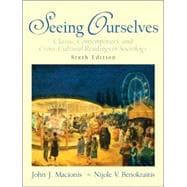
(NOTE: Readings in bold are new to this edition.)
THE SOCIOLOGICAL PERSPECTIVE.
SOCIOLOGICAL RESEARCH.
CULTURE.
SOCIETY.
SOCIALIZATION.
SOCIAL INTERACTION IN EVERYDAY LIFE.
GROUPS AND ORGANIZATIONS.
DEVIANCE.
SEXUALITY.
SOCIAL STRATIFICATION.
GENDER.
RACE AND ETHNICITY.
AGING AND THE ELDERLY.
THE ECONOMY AND WORK.
POLITICS, GOVERNMENT, AND THE MILITARY.
FAMILY.
RELIGION.
EDUCATION.
HEALTH AND MEDICINE.
POPULATION AND URBANIZATION.
ENVIRONMENT AND SOCIETY.
COLLECTIVE BEHAVIOR AND SOCIAL MOVEMENTS.
SOCIAL CHANGE AND MODERNITY.
The New copy of this book will include any supplemental materials advertised. Please check the title of the book to determine if it should include any access cards, study guides, lab manuals, CDs, etc.
The Used, Rental and eBook copies of this book are not guaranteed to include any supplemental materials. Typically, only the book itself is included. This is true even if the title states it includes any access cards, study guides, lab manuals, CDs, etc.